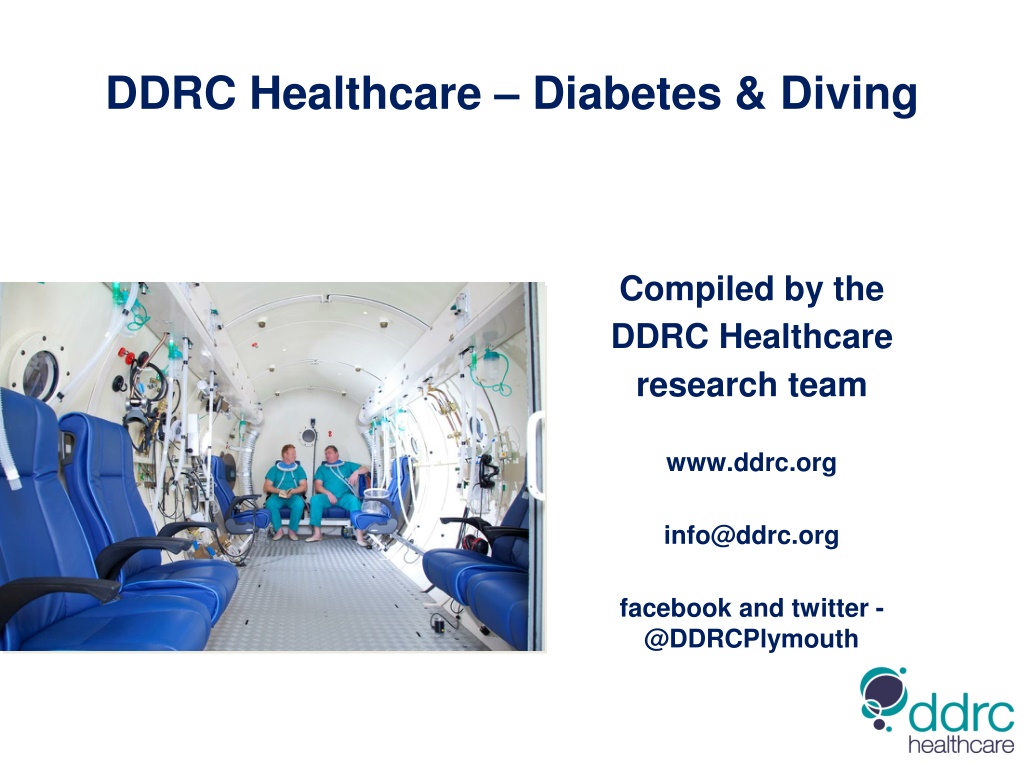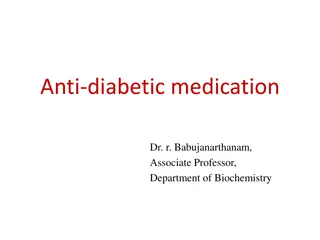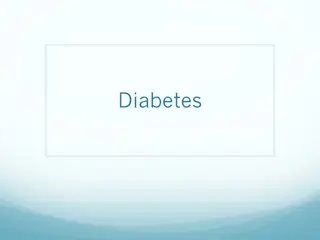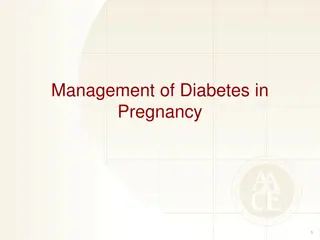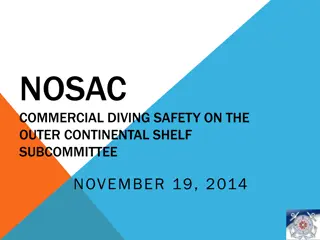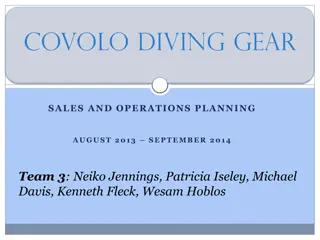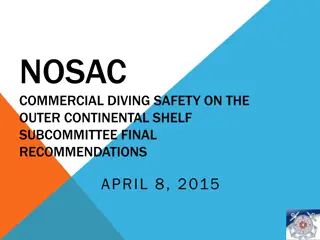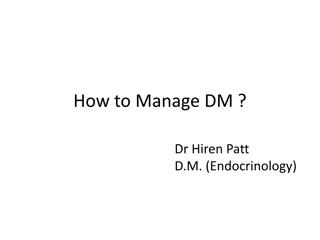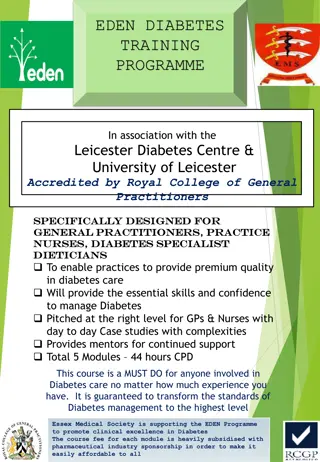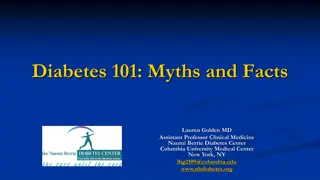DDRC Healthcare -Diabetes& Diving
This compilation by the DDRC Healthcare research team explores the intersection of diabetes management and diving safety. With insights, findings, and recommendations, this resource aims to provide valuable information for individuals navigating diabetes while engaging in diving activities. Learn more at www.ddrc.orginfo@ddrc.org.
Download Presentation

Please find below an Image/Link to download the presentation.
The content on the website is provided AS IS for your information and personal use only. It may not be sold, licensed, or shared on other websites without obtaining consent from the author.If you encounter any issues during the download, it is possible that the publisher has removed the file from their server.
You are allowed to download the files provided on this website for personal or commercial use, subject to the condition that they are used lawfully. All files are the property of their respective owners.
The content on the website is provided AS IS for your information and personal use only. It may not be sold, licensed, or shared on other websites without obtaining consent from the author.
E N D
Presentation Transcript
DDRC Healthcare Diabetes & Diving Compiled by the DDRC Healthcare research team www.ddrc.org info@ddrc.org facebook and twitter - @DDRCPlymouth
What is this talk all about What is diabetes? It is a common health condition 3.9 million diagnosed people in the UK 590,00 estimated undiagnosed >5 million people in 2025 may be diagnosed in UK
Diabetes and diving What is diabetes? When the amount of glucose in the blood is too high This is because the pancreas does not produce sufficient, or any, insulin to help the glucose enter the body s cells Or, if insulin is produced the body does not react to it
Diabetes and diving What is diabetes? Insulin is a hormone produced by the pancreas It enables glucose to enter the body s cells We need glucose for energy to function properly The liver produces some glucose, but the rest comes from digesting carbohydrates
Diabetes and diving What is diabetes? There are two types of diabetes, Type 1 & Type 2 Type 1 - approximately 5% to 15% of diabetics The body is unable to produce any insulin Treated with insulin injections, & healthy diet Can develop at any age, but usually before age 40
Diabetes and diving What is diabetes? Type 2 - approximately 85% to 95% of diabetics Your body can still make some insulin, but either not enough, or the body does not react to it normally Usually develops after the age of 40, there are some ethnic exceptions Treated with healthy diet, increased exercise, and often with tablet medication and eventually insulin which may be necessary
Diabetes and diving What is diabetes? Symptoms of undiagnosed diabetes Feeling tired Weight loss Visual disturbance Increased frequency of infection Slow healing wounds Wanting to pass urine more frequently Increased thirst
Diabetes and diving What is diabetes? Development of symptoms Type 1 symptoms are more obvious and develop more quickly, often over weeks Type 2 symptoms develop less quickly, often over years and so are less obvious In both types symptoms respond well to treatment
Diabetes and diving What is diabetes? To put it simply . Your body does not regulate or utilise glucose in the correct way As a result it accumulates in the blood and can t be used as energy The increased blood glucose also causes damage to the body s tissues.
Diabetes and diving Treating diabetes? The aim of treatment is to normalise elevated blood sugar BUT: Some treatments have the potential side effect of decreasing the blood sugar too much This can cause confusion, slurred speech, visual problems, seizures, decreased consciousness and ultimately coma.
Diabetes and diving Diving with diabetes? Why is it important for divers to understand the basics of diabetes if there is a diver with diabetes in the club/school? Someone with diabetes may suffer from a hypo (hypoglycemia) and needs this to be recognised and acted upon What is a hypo? A hypo is when blood sugar levels fall too low. This may be caused by too much medication, too little food, concurrent illness or diving itself
Diabetes and diving Diving with diabetes? What are the symptoms of a hypo? Symptoms vary from one person to another Diabetics who dive, and their buddy, should be able to recognise these symptoms when they are happening: Feeling tired, confused, anxious, and/or moody Heart beating quickly, fuzzy vision, feeling hot & sticky Tingling lips, feeling weak and shaky Looking pale Feeling hungry
Diabetes and diving Diving with diabetes? There has been much debate and research over the years as to whether divers with diabetes should be allowed to dive In 2005 a major workshop in the USA with 50 clinicians from 7 countries set guidelines that were agreed by all present Since then research has continued to study divers with diabetes The best information can be found at the UK Diving Medical Committee (UKDMC) and DDRC Healthcare websites
Diabetes and diving Diving with diabetes? The UKDMC has stated these 4 criteria: The diver should be over 18, and not experienced a hypo in the last 12 months Has not been hospitalised for any diabetes problem in the last 12 months The Dr at the diabetic clinic is satisfied with the level of control, and that the potential diabetic diver is mentally and physically fit to dive There must be no microalbuminuria present (protein in urine). Any degree of retinopathy beyond background retinopathy is not allowed (damage to the retina of the eye). There must be no evidence of neuropathy (nerve cells- sensory, motor or automatic), nor of vascular or microvascular disease beyond the background retinopathy in the eye
Diabetes and diving Diving with diabetes? What to avoid: Dive planning Depths of >30 msw until experience is gained on how diabetic control is affected by diving Do not dive with a buddy who is also diabetic Situations that may increase the risk of a hypo (prolonged , cold, stressful dives) Dive leader and buddy should be informed of diver s condition Both should have instructions in case of a problem
Diabetes and diving Diving with diabetes? Glucose Management on Day of Diving The diver should: Be able to self-assess their own fitness to dive on the day Have intended blood glucose level stable or rising, before the dive Check blood glucose levels before and after the dive Carry readily accessible oral glucose during all dives Have a medication called glucagon available at the surface Check their blood sugar frequently for 12-15 hours after diving Log all their dives including blood glucose levels
Diabetes and diving Diving with diabetes? If you suspect a hypo in your buddy while underwater: The diver should ingest glucose The diver should make a controlled ascent with their buddy Establish positive buoyancy Leave the water
Diabetes and diving Diving with diabetes? I have diabetes and want to dive what happens next? Download forms A and B from the UKDMC website (on the next slide) Liaise with your dive club branch Diving Officer regarding any other leaflets Form A to be filled in by the diver on an annual basis Form B completed annually by the physician in charge of the diabetic diver Make sure both the forms are correctly signed by all concerned Copy both forms, keeping one copy for you and your dive club/school Send the originals to Dr C.J. Edge The Stone Barn, Gravel Lane, Drayton, Abingdon, Oxon OX14 4HY
Diabetes and diving Diving with diabetes A & B forms & more information The UK Diving Medical Committee Information about diabetes and the link to down-load the A & B forms and additional information www.ddrc.org/diving/can-i-dive/can-i-dive-diabetes DDRC Healthcare More information about diving with diabetes www.ddrc.org/diving/can-i-dive/can-i-dive-diabetes Divers Alert Network (DAN) Further information and DAN research details https://alertdiver.eu/en_US/articles/diving-with-diabetes-guidelines-and-latest-research
Who and what is DDRC Healthcare? Emergency recompression Education Fitness to dive advice Research Training Wound Care Medicals Building the future
